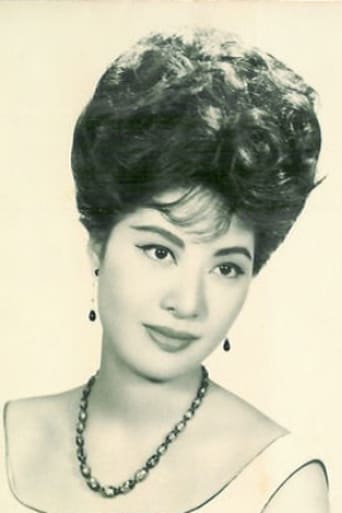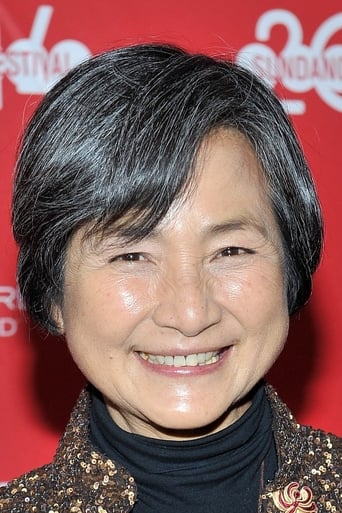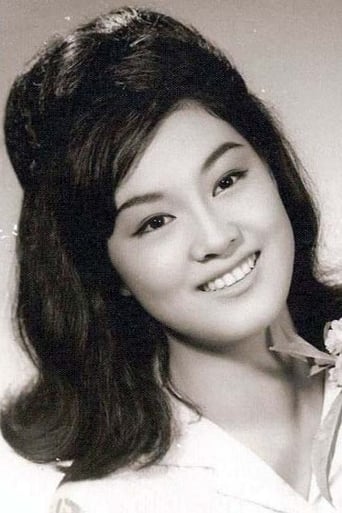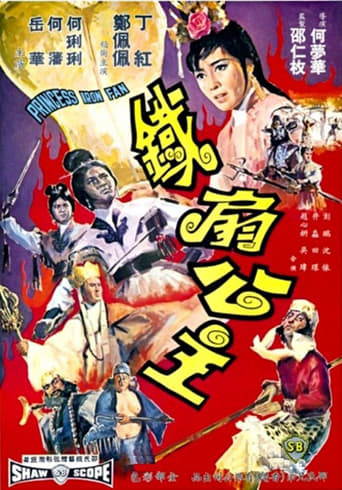
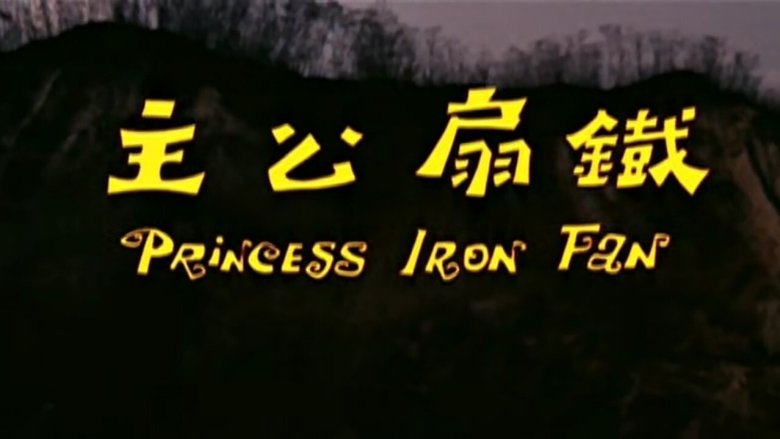
Princess Iron Fan (1966)
The mythological tale of a quest from China to India to bring back Buddhist scriptures, famous for the adventures of Sun Wukong, the notorious Monkey King.
Watch Trailer
Cast
Reviews
Simply Perfect
Good movie but grossly overrated
The performances transcend the film's tropes, grounding it in characters that feel more complete than this subgenre often produces.
After playing with our expectations, this turns out to be a very different sort of film.
PRINCESS IRON FAN is the second in a series of Shaw Bros. live-action adaptations of "Journey to the West," the mythological tale of a quest from China to India to bring back Buddhist scriptures, famous for the adventures of Sun Wukong, the notorious Monkey King. This one focuses on two distinct incidents from the saga. The first involves Monkey King's encounter with Princess Iron Fan and the Ox King and his attempt to get the Iron Fan from them to fan out the fire on Flame Mountain blocking the way of the Tang Monk and his party. The second deals with Lady White Skeleton and her sister and their attempt to abduct the Tang Monk away from Sun Wukong's protection in order to eat his flesh and become immortal. The decision to limit the movie to two episodes in a 93-minute film, each with a distinct beginning, middle, and end, makes for better storytelling and greater entertainment value. (The first film in the series, THE MONKEY GOES WEST, was all over the place, story-wise, and suffered for it.) It's helped considerably by the quality of the acting, especially the three female Shaw Bros. stars who play Princess Iron Fan (Pat Ting Hung), Lady White Skeleton (swashbuckling star Cheng Pei-Pei) and her sister (Lily Ho). Each of these characters is beautiful and sexy, but also crafty and duplicitous, and they give the resourceful Monkey King quite a challenge. In one very funny scene Monkey impersonates the Ox King to seduce Princess Iron Fan and learn from her the whereabouts of the fan. But then the real Ox King shows up.The actresses all play it with a certain amount of Peking Opera stylization, as befitting the theatrical conventions that have traditionally told these stories. They're an absolute delight to watch, as are all the other actors, including Yueh Hua, who usually played stolid hero types in swordplay movies (TWELVE GOLDEN MEDALLIONS) or supporting roles in ensemble casts (KILLER CLANS), but rarely got the chance to really show his stuff as he does here in his role as the Monkey King.The makeup works fine and the special effects are simple but effective. The action is photographed on lavish Shaw Bros. sets and picturesque Taiwan locations. The original Chinese music score draws on traditional instruments and melodies. The first film in the series was THE MONKEY GOES WEST and the subsequent ones were CAVE OF SILKEN WEB (listed on IMDb as POON SHUT DUNG and also reviewed) and LAND OF MANY PERFUMES.The tale of Princess Iron Fan was also told in the first Asian animated feature, PRINCESS IRON FAN, produced in Shanghai (in black-and-white) in 1941.
This is the second of the Shaw Brothers productions of stories from the classic Chinese folk tale Journey to the West. The first film in the series, The Monkey Goes West, introduces us to Monkey, Pigsy and Sandy, who, as companions and protectors, accompany the monk Tripitaka on his journey to acquire Buddhist scriptures.This segment relates the story of Princess Iron Fan's efforts to kidnap Tripitaka and eat his flesh so that, along with her followers, she will gain immortality. The intrepid Monkey is not fooled by her efforts (unlike the hapless Pigsy and Sandy) and saves the day and Tripitaka's flesh. The release by Celestial Pictures, who is reissuing the entire Shaw Brothers catalog, has been beautifully restored.As with the first in the series, the film presupposes a basic knowledge of Journey to the West. This is all well and good for the Chinese audience, who learned the story as American children learned about Snow White. For many non-Chinese, though, the narrative leaps can be a bit confusing. At one point, for instance, Monkey is sent back to Fruit and Flower Mountain, where he is Monkey King, but the very entertaining tale of Fruit and Flower Mountain, and how Monkey came to be Monkey King, is never explored. There are a few references to Monkey's troubles in Heaven and what an annoying fellow he can be, but no explanation about the magical staff with which he bests his enemies.That aside, it's a very entertaining film. For those interested in the background of the story and who may not have the time or interest to read the multi-volume Journey to the West, Monkey (translated by Arthur Waley) covers about half of the one hundred chapters in the original story and, most importantly, relates the history of the four travelers. The films will be much more appreciated for the effort.
